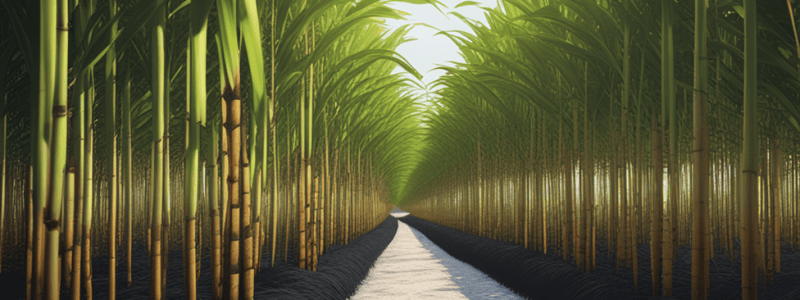Podcast
Questions and Answers
What was the impact of sugarcane cultivation on Mauritius' economy?
What was the impact of sugarcane cultivation on Mauritius' economy?
- It caused a decline in cultural diversity
- It became the cornerstone of the economy (correct)
- It had no significant impact on the economy
- It led to a decrease in urbanization
Which colonial power introduced sugarcane to Mauritius?
Which colonial power introduced sugarcane to Mauritius?
- Spanish
- Dutch (correct)
- British
- French
What role did industrialization play in the growth of the sugar industry in Mauritius?
What role did industrialization play in the growth of the sugar industry in Mauritius?
- It caused cultural stagnation
- It led to a decline in sugar production
- It had no impact on the sugar industry
- It promoted the growth of the sugar industry (correct)
Who were some of the cultural groups that played a role in shaping Mauritius due to sugarcane cultivation?
Who were some of the cultural groups that played a role in shaping Mauritius due to sugarcane cultivation?
What percentage of Mauritius' foreign exchange earnings did sugar account for until the early 2000s?
What percentage of Mauritius' foreign exchange earnings did sugar account for until the early 2000s?
How did Mauritius' sugar industry pivot after gaining independence in 1968?
How did Mauritius' sugar industry pivot after gaining independence in 1968?
What challenge did Mauritius face in the global sugar market after the end of the EU's quota system in 2017?
What challenge did Mauritius face in the global sugar market after the end of the EU's quota system in 2017?
Flashcards are hidden until you start studying
Study Notes
History of Sugar Cane Cultivation in Mauritius
An intriguing chapter of human endeavor unfolds in the story of sugar cane in Mauritius, tracing back to the Dutch colonial era in the mid-17th century. Originally brought by the Dutch in 1640, sugarcane thrived on the fertile soil and favorable climates of the island. Over time, it transformed not only Mauritius' landscape but also its culture, economy, politics, and society.
Early Development and Economic Growth
Since the introduction of sugarcane, agriculture became the cornerstone of the Mauritian economy, with sugar becoming its principal export commodity. As the sugar industry expanded, industrialization followed suit, promoting urbanization and a unique blend of cultures formed by creoles, Indians, Chinese, Africans, French, British, and Dutch descendents.
Colonial Era and Post-Colonial Challenges
From the Dutch rule until the late 20th century, the sugar sector flourished under various colonial powers, evolving along with the international political context. After Mauritius gained independence in 1968, the sugar industry remained a symbol of strength, thanks to its pivot toward the European Union (EU). Until the early 2000s, sugar accounted for approximately 70% of Mauritius' foreign exchange earnings.
But after the end of the EU's quota system in 2017, Mauritius, alongside several developing nations, experienced fiercer competition in the global sugar market. This disruption triggered financial instability affecting small-scale sugarcane producers, whose numbers dwindled from 26,000 to 13,000 between 2010 and 2018.
Despite these challenges, the Mauritian sugarcane industry persists and seeks innovative solutions, including a shift towards renewable energies based on biomass generated during the sugar manufacturing process. Bagasse, the residue remaining after crushing sugarcane stalks, supplies roughly 14% of Mauritius' electrical energy requirements today.
As the historical evolution demonstrates, Mauritius leveraged sugarcane's potential in multiple ways, continuously reinventing itself amidst societal, ecological, and economical transformations.
Studying That Suits You
Use AI to generate personalized quizzes and flashcards to suit your learning preferences.



